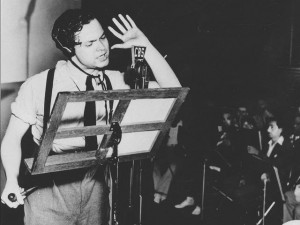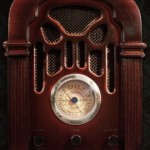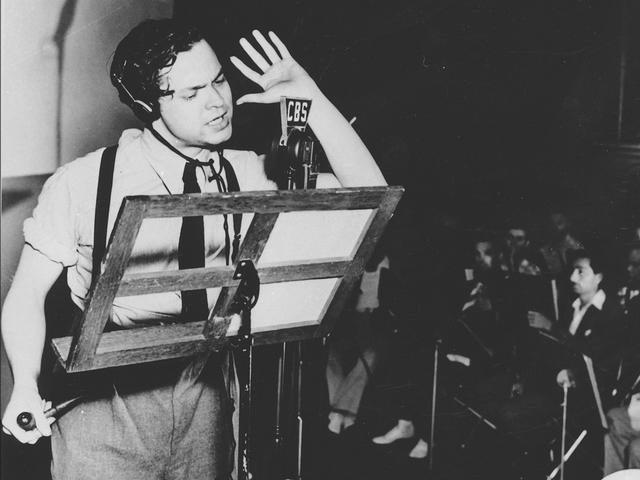 Seventy-five years ago tonight, Orson Welles unleashed what would become one of the most famous and influential productions of mass media science fiction on an unsuspecting public.
Seventy-five years ago tonight, Orson Welles unleashed what would become one of the most famous and influential productions of mass media science fiction on an unsuspecting public.
The Mercury Theatre on the Air’s presentation of The War of the Worlds—H.G. Wells’ seminal alien invasion novel, brilliantly adapted as a series of “breaking news” announcements by playwright Howard Koch—is the stuff of modern American legend, not only for its effectively hair-raising format (I still shudder when I hear the heat-ray fry the poor people of Grovers Mill to a crisp) but also for the panic it caused among those who, for whatever reason, failed to realize they were listening to a drama rather than a documentary. It’s true, as Slate magazine explained this week, that the broadcast-induced frenzy was far smaller than later generations came to believe (mostly because print journalists, already panicked at the hit their circulation and ad revenue were taking at radio’s upstart hands, were eager to highlight the new medium’s problematic potential). Even so, Welles’ broadcast remains a defining moment for not only science fiction but also America’s relationship to its media. Both NPR’s Radiolab and PBS’ American Experience are exploring The War of the Worlds’ legacy this week, and I encourage you to listen and watch both programs.
I’ve told my fellow sci-fi Christians of my affection for the “panic broadcast” before. This year, I wanted to alert you to some brand-new audio dramas commemorating its diamond jubilee. Aural Stage Studios recently sponsored a contest seeking original audio dramas, no longer than 15 minutes, inspired by Wells’ and Welles’ tales of terror from the Red Planet. The rules stated, “Productions must include all of the following elements: arrival inside a meteorite; tripods are used for locomotion; massive destruction; natural biological solution.”
Had I known about this contest, I might have gotten over my dislike for the microphone, written a script, and rounded up some friends to record an entry! Alas, I didn’t; but I have enjoyed listening and re-listening this week to each of the three winners, and I commend them to you, too.
- The Refertilisation of Weed Planet 313 by Ron Jon Newton recounts the invasion from the Martian perspective, yielding insight you might not expect. The increasingly anguished transmissions from the Martian tripod operators to their commanders back home lead me to think about how quick we are to demonize those who are different from us, and to appreciate again the wisdom in Jesus’ call, “Love your enemies and pray for those who persecute you” (Matthew 5.44).
- Herbert West versus the Martians (A Tale of Our Fair City) by audio drama troupe Hartlife NFP in Chicago is my personal favorite of the three. It’s a hilarious romp through the tropes of space invader stories, starring a ridiculously larger-than-life scientist who seems to save the day almost despite himself. Don’t let his chipper tone fool you too much, however; there’s an unexpected dip into darkness at the end that reminds us, in the prophet Jeremiah’s words, that the human heart “is devious above all else; it is perverse—who can understand it?” (17.9). All have sinned and fall short of God’s glory, even swaggering, square-jawed Herbert West.
- Finally, first-place winner Dead London by the UK’s Wireless Theatre Company returns Wells’ Martians to their old stomping grounds, adapting the Mercury Theatre’s listen-as-it-happens approach (well suited to the modern, social media age, it turns out—for example, the falling cylinder almost immediately gets its own Twitter hashtag) but preserving the novel’s English locales. In fact, the drama was recorded live and entirely on location at Horsell Common, as in Wells’ original. (Grovers Mills gets spared this time around!) Dead London treats the Martian invasion as an apocalypse, not just in the sense of a world-ending event, but also in the sense the original Greek word suggests. An “apocalypse” is, literally, an unveiling, a revelation… and what Dead London’s characters learn about themselves when all they know is stripped away may be more terrifying than any tripod.
 Fans of The War of the Worlds won’t want to miss this trio of imaginative, engaging, high-quality audio dramas. Listening is free, and these forty-five or so minutes are the perfect way to mark a true genre milestone.
Fans of The War of the Worlds won’t want to miss this trio of imaginative, engaging, high-quality audio dramas. Listening is free, and these forty-five or so minutes are the perfect way to mark a true genre milestone.


Good article, as always. The radio broadcast is quite an enigma. I actually listened to it for the first time, last year on a road trip.
Today, it’s hard to take seriously. But the legend goes that it really caused panic and the belief of extraterrestrial-caused peril. Oddly enough, the broadcast does have two disclaimers of its fictional existence as a dramatized adaptation. One in the obvious beginning, and surprisingly, another in the later part of the thing.
I know some people think the broadcast was a cruel realization, but really, it was quite a clever and genius concept. I don’t think its producers had a feel for how listeners would eventually take it. It is an early example of the power of media’s manifestation of influence.
If you remember the great show, Touched by an Angel, which ran from ’94 to ’03; they had a fantastic episode in their third season, “The Sky is Falling”, which dealt with a man’s memories of chaos caused from the broadcast. That’d be a great thing to dig.
Thanks for reading and commenting, Wes!
About those disclaimers – yes, there were two announcements of what the show was; but the first one was, unsurprisingly, at the outset, and many more listeners were tuned into Edgar Bergen and Charlie McCarthy at the time, and didn’t switch over to CBS until their routine was over and the Martians were already destroying Grovers Mill; and the second came a half-hour or so into the broadcast, by which time those who were going to panic already had.
Welles was, of course, a brilliant showman who knew exactly what he was doing. He said later he wanted to encourage critical consumption of the media, but he also got a sponsor for Mercury Theatre out of the broadcast and made himself a household name.
…Dig up, that is.
Thanks so much for the great review of Our Fair City! If you want to hear more of the show, you can check it out on our website: http://www.ourfaircity.com.
Jeff, I definitely will! Your WOTW production was such great fun, how could I resist hearing more?
Thank you for kind words on Dead London; we have over 130 plays available at http://www.wirelesstheatre.co.uk too!
“Dead London” was a fantastic production, Jack – you and your crew should be very proud of it, and I will look forward to checking out some of your other work!